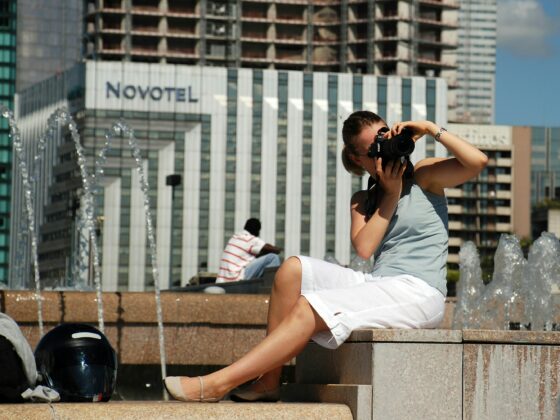Every year, ITB Berlin sets the hospitality industry’s pulse racing—not just because of the event itself, but because industry insiders turn hotel guests and critics overnight. Hotels brace themselves as travel professionals, accustomed to evaluating services and providing reviews of their experiences. Using data from the Global Review Index (GRI), our review analytics team analysed trends spanning three years: 2023, 2024, and 2025. His findings highlight shifts in industry sentiment, giving hoteliers a unique peek into how their peers judge their performance.
ITB Berlin is one of the most significant events for the Berlin hotel industry, driving some of the highest occupancy rates and room prices of the year. During the week, hotel occupancy typically surges to 90–98%, compared to the city’s usual 60–80% in non-event periods. Average daily rates (ADR) see a sharp increase, often 20–60% higher than regular March pricing, with some hotels near the Messe charging 2–4× their standard rates. The majority of attendees—around 70–75% of the 100,000+ visitors—are travel industry professionals. With such a concentrated demand, ITB Berlin creates a unique hospitality environment where hotels cater to a highly discerning, professional audience, setting expectations for service quality and customer experience.
However, as the event wraps up and delegates depart, hotels face a shift in guest expectations—from premium-paying business guests to regular tourists—often leading to fluctuating satisfaction levels post-event. Understanding how hotel guests, particularly trade professionals, evaluate their stay during and after ITB is essential in assessing how well Berlin’s hospitality sector meets the demands of this critical annual influx.


Takeaways
Noise complaints consistently dominate negative reviews, significantly affecting sleep quality.
Location issues highlight a clear gap between guest expectations and actual hotel positioning.
Room size and ventilation problems emerge repeatedly, necessitating infrastructure upgrades.
Outdated and poorly maintained facilities undermine overall guest satisfaction, requiring regular investment.
Positive mentions are increasing, indicating hotels excelling in guest experience can differentiate themselves.
Understanding the GRI Dynamics:
Over the last 12 months, the GRI for ITB Berlin 2025 recorded its lowest annual point on 8th March, immediately after the event. For hotels, ITB feedback isn’t just guest opinion—it’s peer review from industry colleagues who understand precisely what to look for. This year’s event attracted slightly fewer than 10,000 reviews, a decrease from around 11,000 in 2023. Fewer reviews meant specific negative issues emerged more prominently than in previous years.
Trending Negative Concepts: A Year-by-Year Comparison
Comparing 2023, 2024, and 2025, the top guest complaints shifted notably. Analysing these changes helps identify persistent issues and emerging concerns.
| Rank | 2025 | 2024 | 2023 |
| 1 | Location | Room | Room |
| 2 | Sleep | Staff | Price |
| 3 | Room | Breakfast | Location |
| 4 | Hotel | Service | Bathroom |
| 5 | Noise | Window | Staff |
Delving Deeper into 2025’s Key Issues
Location Challenges
Location topped 2025’s complaints. Guests frequently cited issues like excessive noise, such as proximity to train tracks, busy streets, or noisy clubs. Another consistent complaint was distance, with hotels considered far from central attractions or inconveniently placed near public transport. It should be noted that Berlin is a large city, and the ITB Messe is not centrally located. During ITB, hotels are extremely busy, forcing many attendees to stay across the city—sometimes even on the opposite side—which inevitably leads to location complaints.
Sleep Disruptions
Even hospitality and travel professionals lose patience when sleep is compromised. Sleep complaints largely stemmed from noise disruptions. Guests mentioned loud music from nearby clubs lasting into the early hours. Additionally, uncomfortable room temperatures, either excessively cold or hot, aggravated by malfunctioning air conditioning units, significantly affected sleep quality.
Room Size and Comfort: Expectations vs Reality
Experts frequently critiqued room dimensions, ventilation, and comfort. Many rooms were seen as cramped or inadequately ventilated, highlighting an industry-wide issue with infrastructure standards that professionals themselves recognise immediately upon entering.
Hotel Condition
Outdated or poorly maintained facilities didn’t escape the trained eyes of experienced travellers and industry professionals. Reviews consistently mentioned cleanliness concerns and outdated décor. This professional feedback offers clear advice for hoteliers to prioritise regular maintenance and upgrades.
Noise Levels
Noise consistently impacted guest experiences, heavily influencing other negative feedback areas like sleep and location. Loud activities from streets, music venues, or internal hotel disturbances were repeatedly mentioned, indicating a need for hotels to implement better soundproofing measures.
Semantic Analysis: The Silver Lining
Despite numerous negative reviews, semantic analysis showed an increased volume of positive mentions compared to previous years (71.9%, +1.1 points over the same period last year). This indicates opportunities for hotels to prioritise guest feedback. Properties excelling in service delivery and problem resolution stand out positively amidst broader dissatisfaction.


Recommendations for Hoteliers
To better cater to future ITB attendees—your fellow industry experts—consider:
- Soundproofing Enhancements: Implement effective soundproofing in rooms and common areas to mitigate noise complaints.
- Facility Modernisation: Regular maintenance and timely updates of hotel facilities to address cleanliness and outdated décor.
- Accurate Location Descriptions: Clearly stating hotel proximity to attractions and public transport to set realistic guest expectations.
- Room Comfort: Investing in functional air conditioning and ventilation systems to enhance guest comfort.
- Service Excellence: Leverage strong customer service to resolve issues swiftly and turn negative experiences into positive impressions. Data indicates that improvements in staff and service positively impacted overall hotel performance. Over the past three years, staff-related reviews shifted significantly—from reducing the GRI by 0.6 points in 2023 to elevating it by the same margin in 2025.
Final Thoughts
Guest satisfaction during high-profile events like ITB Berlin is critical for hotel reputation management. Reviewing GRI data annually allows hotels to identify trends, improve guest experiences, and maintain competitive advantages. Hoteliers can significantly enhance guest satisfaction by proactively addressing recurring guest concerns—especially regarding noise, room comfort, and facility conditions.










